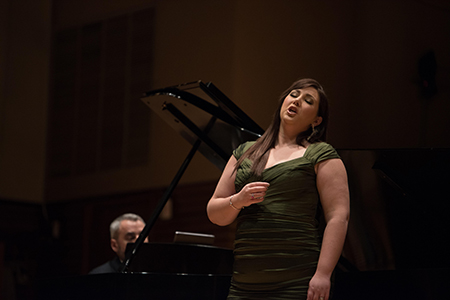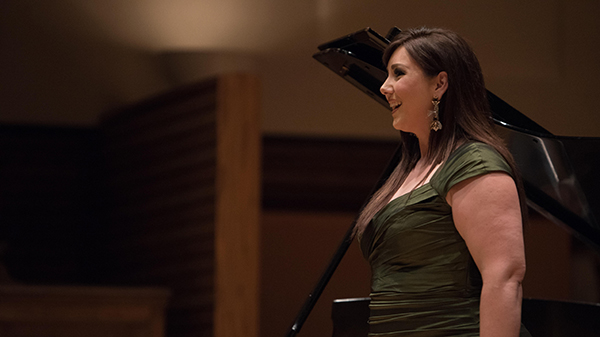by Daniel Hathaway

In her notes in the program booklet and her remarks onstage, Rowley sought to demonstrate what the elusive term bel canto actually means. She quotes a newspaper interview with bel canto expert Will Crutchfield: “Sometimes it means the generation of Rossini, Bellini, and Donizetti, and sometimes it means the whole tradition of Italian singing.”
Rowley goes on to call bel canto “a virtuosic style with emphasis on technical skill, coloratura, a beautiful legato line, evenness of tone and the dynamic use of messa di voce…embellishment for emotional purposes, and the use of ornamentation as a means to move the drama forward.”
Well, it may be difficult to pin down in words, but Rowley gave the good-sized audience a clear demonstration of bel canto in her performances on Friday evening, a convincing argument that the “beautiful singing” concept applies equally well to the drawing room and to the opera stage.
From the opening notes of the Mayr scene, Jennifer Rowley filled Gamble Auditorium with vibrant sound. Her voice is big but agile, and her communicative skills draw an audience deeply into the text she’s declaiming.
Unfortunately, BW ran out of program booklets well before the beginning of the concert, but Rowley’s stage presence was sufficiently arresting that following a printed text was largely unnecessary. She put across Medea’s exasperation with Jason in energetic coloratura and stunning high notes.

“Pour notre amour” from William Tell returned Rowley to the opera stage in the role of the grieving lover — this time because Arnold has told Mathilde that he’s leaving to join the Swiss resistance to Austrian rule. Here, the soprano brought beautiful singing to French words as effortlessly has she had to Italian.
Six of Bellini’s Italian Ariette — little vignettes that served as studies for the composer’s larger forms — provided another contrast in scale for Jennifer Rowley, who infused each of them with individual character.
“For some reason, all the bel canto sopranos go crazy,” Rowley said by way of introduction to the final ‘mad’ scene from Donizetti’s Anna Bolena. A study in contrasting emotions — just what you’d expect from a woman about to be beheaded — the scene demanded intensity and edge-of-the-seat drama, and Rowley delivered. (She’ll appear as all of Donizetti’s three queens this summer.)
Rapturous applause brought Rowley and Aquila back for an encore, in which the soprano stretched the bel canto rubric to include Eliza’s song “Burn” from Hamilton.
Published on ClevelandClassical.com February 25, 2019.
Click here for a printable copy of this article


